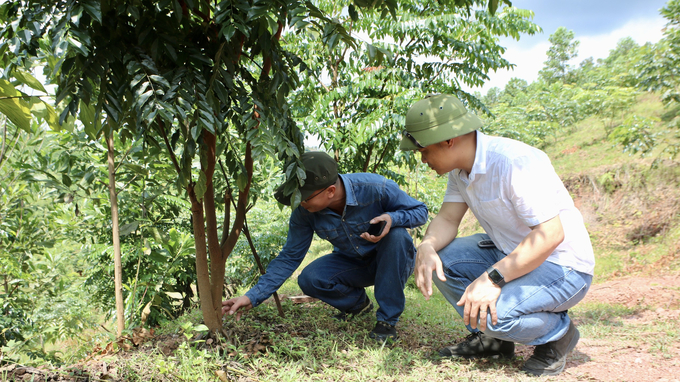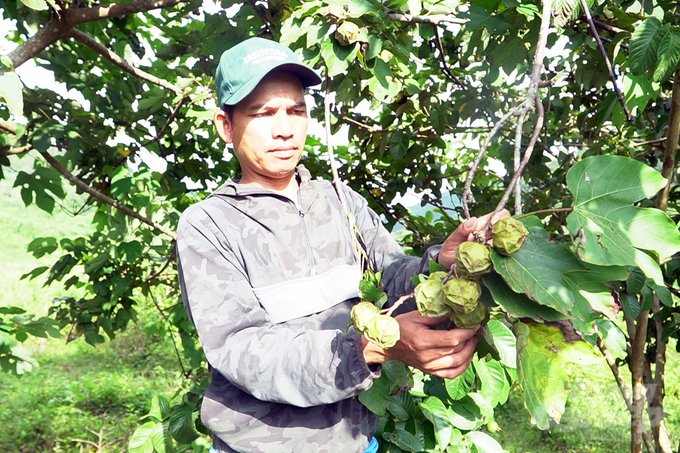May 21, 2025 | 09:13 GMT +7
May 21, 2025 | 09:13 GMT +7
Hotline: 0913.378.918
May 21, 2025 | 09:13 GMT +7
Hotline: 0913.378.918
According to Assoc. Prof. Dr. Dang Thi Thanh Le from the Faculty of Chemistry and Environment (Thuy Loi University), saponins, also known as saponosides, are a large group of glycosides present in many plants (both wild and cultivated). There are two types: acidic saponins (mainly found in cultivated plants) and neutral saponins (mostly found in wild plants, particularly herbs).
Saponin is bitter and pungent, which helps protect crops against insects, bacteria, and fungi. It disrupts the respiration and digestion of animals and deters harmful insects by causing feeding aversion and death.
Pesticides with saponin are as effective as chemical pesticides in controlling pests, but they are safer for human health, do not cause pest resistance, and break down naturally in the environment.
Although saponin has been extensively researched and used in herbal pesticides worldwide, studies in Vietnam remain limited. So far, research has focused on extracting saponin from tea seed meal, tung, and Chinese toon to control golden apple snails, nematodes, and soil pests.
Among the 571 plant species collected by scientists from the Institute of Chemistry and the Plant Protection Research Institute, no research has explored the extraction of saponin for herbal pesticide use.

Black locust is one of the plants with great potential for pesticide production. Photo: TQ.
Data from Dr. Le's research group shows that among 11,661 plant species in Vietnam, 116 contain saponin. Of these, 24 species have been used traditionally to protect crops from pests (six of them have saponin content exceeding 3%, including soapberry, tea, camellia, tung tree, Chinese toon, and black locust ). Four of these have already been researched and applied for pest control, namely Chinese toon, camellia, tung tree, and tea.
Soapberry has a saponin content of 16-18%, while soap pod has 9-11%. These plants are abundant across Vietnam’s ecosystems but have not yet been widely researched or applied for pesticide production.
Additionally, the list of plant protection chemicals permitted for use in Vietnam currently includes 46 commercial products containing the active saponin. This includes 37 commercial products with saponin as the active ingredient and 9 mixed commercial products containing saponin, which are used to control golden apple snails harmful to rice, armyworms, cabbage loopers, aphids harmful to green mustard, cabbage, psyllids, red mites harmful to squash, watermelon, cucumber, oranges, tangerines, aphids, and table-grape red mite, etc.

Tung tree is being widely cultivated in several localities and can be used in the production of pesticides. Photo: TQ.
While the tung tree is being actively cultivated in some localities for herbal pesticide production, most saponins are still imported from China and Thailand as by-products of tea seed oil pressing. Most saponin-containing pesticides are either imported or processed and packaged locally.
With the six common Vietnamese plants (soapberry, tea, camellia, tung tree, Chinese toon, and black locust) rich in saponin, there is a need to focus on extracting saponin from these species to produce domestic pesticides.
In addition, to develop the production of pesticides containing saponin domestically on an industrial scale, more investment is needed in research and pilot production projects. Strengthening international cooperation to acquire the latest technologies for economic efficiency will create momentum to develop saponin-based pesticides in Vietnam.
Translated by Kieu Chi

(VAN) In 2024, over 295 million people across 53 countries and territories faced acute hunger—an increase of almost 14 million people compared to 2023, while the number of people facing catastrophic levels of hunger reached a record high.

(VAN) World Environment Day 2025 (June 5) carries the theme 'Beat Plastic Pollution' continuing to emphasize the global urgency of addressing the plastic waste crisis.

(VAN) This was the assessment shared by experts at the workshop titled 'Assessing the Role and Potential of Low-Emission Rice Production Systems in Vietnam,' held on the morning of May 19.

(VAN) Cai Rong Port is the fisheries control center of Quang Ninh, helping to monitor fishing vessels, combat IUU fishing, and remove the EC's 'yellow card'.

(VAN) The German Agricultural Society (DLG) explores the possibility of establishing a mechanization service center in Vietnam’s Mekong Delta to support farmers in accessing and utilizing advanced machinery.

(VAN) On May 16, the Department of Water Resources Management, in collaboration with the Food and Agriculture Organization of the United Nations (FAO), held a signing ceremony for the GEF-8 project document.

(VAN) Food safety, mechanization, vocational training, and market opening are key areas of cooperation expected between the Vietnamese Government and the Federal Republic of Germany.